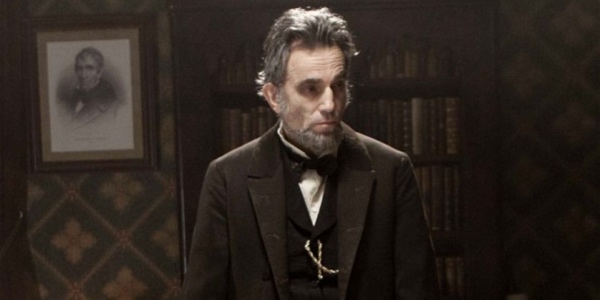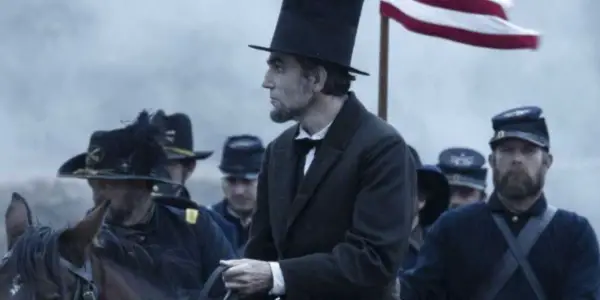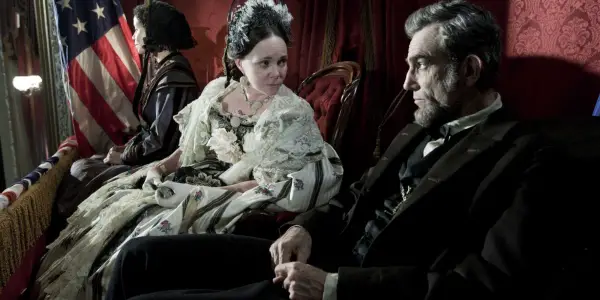The Half-Hearted Demythification Of LINCOLN

Andrew Emerson is a University of Chicago student. His high…
When Steven Spielberg’s Lincoln was first released, many critics claimed that Spielberg had succeeded in portraying “Lincoln the man” instead of “Lincoln the legend.” In the San Francisco Chronicle, for instance, Mick LaSalle asserted that Spielberg “takes Lincoln down from his memorial and transforms him, from a timeless sage back into the product of…the American frontier.” Roger Ebert, moreover, noted that “I’ve rarely been more aware than during…‘Lincoln’ that Abraham Lincoln was a plain-spoken…man from…Kentucky.” And The New York Times’ A.O. Scott praised Lincoln for dismantling stereotypes, comparing it favorably to the many films that caricaturize presidents as “square-jawed action heroes, stoical Solons or ineffectual eggheads.”
In two respects, to be sure, Lincoln certainly does break through the “great man” mythology surrounding America’s 16th president. One of them is Daniel Day-Lewis’ performance as Lincoln. Given the place that Lincoln occupies in American history, we tend to have an image of him as a composed and elegant statesman. The Lincoln of popular imagination speaks with the wise voice of Morgan Freeman, carries himself with the stoic dignity of Gregory Peck’s Atticus Finch, and possesses the rhetorical prowess of The Great Dictator’s barber.
A Portrayal
As many critics observed upon Lincoln’s release, however, Day-Lewis’ portrayal of Lincoln completely upends these expectations. Far from having a poised bearing, Day-Lewis’ Lincoln is an ungainly man who walks with a hunch. In contrast to Freeman’s deep, authoritative voice, moreover, on-screen Lincoln speaks in reedy tones that often make him sound like a stereotypical country bumpkin. And despite his reputation for eloquence, he also spends much of the film telling long-winded anecdotes and indulging in potty humor. On this basic, concrete level, then, the Lincoln we see in Lincoln is a far cry from the otherworldly image that’s advanced in history textbooks.

Day-Lewis aside, Lincoln also subverts the mythology around Lincoln through its cinematography. One good example of this can be found around 25 minutes into the film. In the scene in question, Lincoln is presiding over a raucous cabinet meeting. Several of his secretaries have openly criticized his push for the 13th Amendment, claiming that his Emancipation Proclamation obviates the need for such a guarantee. In response, Lincoln starts by telling a seemingly irrelevant story from his days as a prairie lawyer – before abruptly segueing into a robust defense of his decision to seek an amendment.
The import of this scene becomes clear when you consider how it’s shot. At the moment when Lincoln pivots away from his anecdote, the camera is positioned behind the meeting table. In this initial long shot, Lincoln is perched on a chair at the far end of the room, and we can also see all the secretaries who’re seated at the table. As Lincoln launches into his defense of the 13th Amendment, however, the camera slowly, almost imperceptibly begins to track forward. Over the course of around two minutes, it gradually moves past all of the secretaries, and it eventually ends on a tight medium close-up shot of Lincoln.
As mentioned previously, we like to picture Lincoln as a commanding, Moses-like figure, a leader who instantly won people over with visionary charisma. As suggested by this slow, almost imperceptible tracking movement, however, the real Lincoln was actually an exemplar of “leading from behind.” Just as the camera gradually tracks onto Lincoln, in other words, the real Lincoln gradually won support through the quiet, easily-underestimated force of his ideas – not through any kind of outward, eye-catching magnetism. In this sense, this scene not only rectifies our conventional understanding of Lincoln, but it’s also a corrective to stereotypical notions of what good leadership entails.

Above Politics
And yet, even as it attempts to “demythify” Lincoln, Lincoln often succumbs to the temptation to lionize him. The best place to see this is the sequence that depicts the House vote on the 13th Amendment. As congressmen are shown casting their votes, Spielberg repeatedly cuts to shots of Lincoln in the White House. Far from professing outward concern at the vote’s outcome, however, Lincoln is shown doing things that have nothing to do with politics. In one shot, for instance, he’s seated in a rocking chair and reading a book to his son Todd; in another, he’s shown standing in silent contemplation in his office.
Taken in its entirety, this vote sequence establishes a striking dichotomy. On the one hand, we have the congressmen, politicians who’re depicted in earlier parts of the film as being venal, petty, and combative to a fault. On the other hand, there’s Abraham Lincoln. By juxtapositioning shots of the vote and of Lincoln in his office, this sequence makes the president out to be apolitical, a solemn figure who’s seemingly “above” the bickering that characterizes congressional debate.
Ultimately, this “above politics” portrayal of Lincoln proves problematic for two reasons. For one, it directly contradicts earlier parts of the film, in which Lincoln is shown voluntarily engaging in horse trading for the sake of winning votes. Additionally, in a more general sense, this sequence also advances a stereotyped understanding of Lincoln. By casting him as a pure, incorruptible individual – as though he were a secular saint – it reinforces the unquestioningly reverential attitude that people tend to adopt when considering his presidency.

Conclusion
On the whole, then, Ebert, Scott, and LaSalle’s analyses of Lincoln proved incomplete. At times, Lincoln certainly does shatter the stereotypical image we have of Lincoln. But in other instances, Lincoln can’t help but indulge in hagiography, adopting a worshipful attitude that undercuts its attempts to make Lincoln look like a human being. Despite Spielberg and Day-Lewis’ efforts, then, this film ultimately feels like an exercise in self-contradiction, and it falls prey to the simplifying sentimentalism that characterizes so many of Spielberg’s “serious” films.
Do you agree with me? Why or why not? Please share your thoughts in the comments!
Does content like this matter to you?
Become a Member and support film journalism. Unlock access to all of Film Inquiry`s great articles. Join a community of like-minded readers who are passionate about cinema - get access to our private members Network, give back to independent filmmakers, and more.
Andrew Emerson is a University of Chicago student. His high school English teacher once asked him to read a batch of Roger Ebert’s reviews for class, and he’s been fixated on the idea of writing about movies ever since. You can follow his attempts to pursue this obsession at http://filmwatcher.net/.













